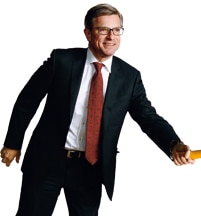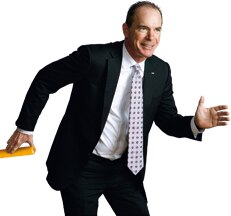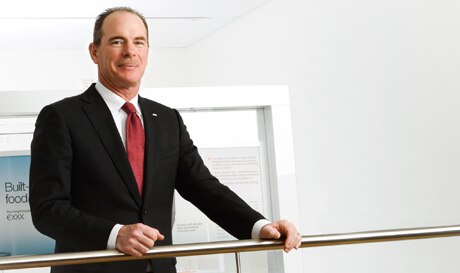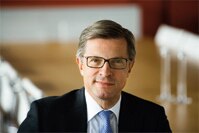The former President and CEO of Electrolux Hans Stråberg and the new President and CEO Keith McLoughlin discuss a number of issues concerning the operations and strategy of Electrolux.


I am especially pleased with achieving this high operating margin in a year marked by relatively difficult conditions. The increase in our profitability was mainly attributable to our own efforts.
Hans Stråberg
On the operating margin, which reached a full 6.1% for 2010, the highest level ever in the current structure.
(Hans)
I am especially pleased with achieving this high operating margin in a year marked by relatively difficult conditions. Demand in our largest markets, North America and Europe, was far from convincing. We experienced downward pressure on prices in certain segments and raw-material prices rose steeply. The increase in our profitability was therefore mainly attributable to our own efforts. We retained our focus on low costs and launched new savings programs early in the recession, our restructuring program continued as planned and we intensified activities focusing on our new global initiatives.
Meanwhile, we have had the resources to take aggressive actions during 2010. We launched multiple new products and increased brand investments; initiatives that have helped enhance the mix. An example of this is the strengthening of our brand positions in North America. The improvement in income for the vacuum cleaner business largely derived from an improved mix through the launch of new products. Moreover, new income and sales records were noted in Latin America and Southeast Asia and Professional Products recorded its highest ever operating margin.
Another key milestone was the near completion of the major restructuring program that we initiated in 2004, with some of the final decisions being taken in December 2010. The program will generate combined cost savings of SEK 3.4 billion per year. We have created an entirely new plant structure with nearly 60% of our production taking place in low-cost areas; the share in 2004 was about 20%.
(Keith)
And our new, global initiative will enable us to further enhance our competitiveness. We anticipate being able to reduce manufacturing, purchasing and product costs by a total of SEK 2.5 billion on an annual basis as of 2015. Additional positive effects include increasing the leverage of product development.
However, what continues to be the most important factor for us is, naturally, how successful we are at developing new products that consumers want and are willing to pay a premium for. For example, the successful launch of new innovative products in the US in recent years has strengthened our position in the higher price segments and has raised our profitability, despite a weak underlying market. When demand in the US gains real momentum, consumption of premium products will increase, thus generating strong leverage for sales of Electrolux products.
We are also strengthening our position in the European premium market. Our first task is to reposition the AEG brand by launching new products in a number of the Central European markets, and we will continue to introduce Electrolux-branded appliances in the premium segment throughout Europe. We will also continue to launch new products within our floor-care operation. The most recent example of this was our successful range of green vacuum cleaners.
On the economy – and above all the historical downturn in demand in the US and Europe.
(Hans)
From its peak in 2006, the US market has fallen by 25%, and sales volumes are currently back at the levels observed in 1998. The European market was also unusually weak in recent years. We have seen a clear trend in consumer behavior take shape. Consumers move down the price segments, favoring less expensive products as long as the economic uncertainty prevailed. In parallel, we have observed a growing need among an increasing number of households to replace old products with new models. The typical life span of an appliance is between 10 and 12 years, and as the current size of the US market is on 1998 levels we can expect that growth will be driven by replacement.
(Keith)
But to get consumers in the US to upgrade, they need to believe that the future looks promising. This in turn would strengthen the real-estate market and encourage people to start renovating their homes again. Various rebate programs, such as last year’s Cash for Appliances in the US, are also driving demand. However, it is imperative that these types of programs are suitably formulated and sustainable, otherwise they risk generating some kind of accordian effect with a resulting decline in demand and large unsold stock in the industry. This would benefit no one – neither manufacturer nor consumer.
On trends – and on which is the most significant and strongest of them all.
(Hans)
Of all the trends that have driven demand in recent years, the growing environmental awareness of consumers has been one of the strongest. This has naturally benefited a company such as Electrolux, with its focus on continuous improvement of the energy and water efficiency of products. We have taken a leading position in this area.
(Keith)
And our status as leader is important, since this trend will become more prevalent in the years to come, across the globe. Our position at the cutting edge of development is highly significant for our potential to grow successfully. We also have the resources to further improve our product development, allowing us to more rapidly launch new products that solve consumer problems, such as water shortages and high electricity costs. We are also leading the debate in the area, most recently with our highly acclaimed PR campaign Vac from the Sea, which drew attention to the pollution of our seas and linked it to the shortage of recycled plastic. Another trend that Electrolux can derive a great deal of benefit from is the increasing consumer interest in design. In this regard, the Group’s Scandinavian roots play a key role.
On growth – areas in which and how Electrolux can grow while maintaining profitability.
(Hans)
Although we only reported a nominal growth in comparable currencies for 2010, it was an important year from the perspective of growth. For the first time in quite a while, we were able to complete and announce strategic acquisitions in key growth markets. These include the washer plant in the Ukraine, providing us with better access to a large and expanding market in the east, and the signing of a Memorandum of Understanding covering the acquisition of the Egyptian company Olympic Group, making Electrolux a significant player in the growth markets of North Africa and the Middle East.
(Keith)
Accelerating our growth is a prioritized task moving forward. Our focus is on leveraging organic growth in rapidly expanding markets, supplemented with selective acquisitions. The acquisitions in the Ukraine and Egypt will also enable us to expand more rapidly in these markets with our existing offering. In simple terms, we view acquisitions as an effective way of boosting our organic growth. The acquisition of Olympic Group is fully in line with our growth strategy, but given the recent events in the region, we have currently, in agreement with our partner The Olympic Group, decided to temporarily put things on hold until stability resumes.
If we succeed in leveraging the organic growth and combine this with acquisitions, our sales from growth markets should increase to about 50% of total sales in a five-year period. If we want to grow more rapidly, we must expand our current presence in these markets. The world map is being redrawn, and this is happening at a rapid pace. Nevertheless, it is naturally important that our expansion takes place with maintained profitability and attractive returns, regardless of whether it is generated organically or through acquisitions.
(Hans)
We have a number of good examples of how we have succeeded with this in the past. Our operation in Brazil is one of these. We acquired Refripar in 1996 and, following an initial transformation period that lasted a few years, our sales in Brazil have increased by an annual average of about 20% since 1999. We are now one of the largest in this rapidly growing and important market and can apply the same strategy in other markets in Latin America.
(Keith)
Because we are a global company – present in over 150 countries – with global platforms for product development, manufacturing and purchasing, we have the capacity to swiftly adapt to new operations and markets. This is a major advantage compared with many of our competitors, and we must now ensure that we are even better at capitalizing on this.
On strong finances – their significance to the generation of higher growth and facilitating the Electrolux ability to continue to pursue shareholder value.
(Hans)
We have been able to create substantial shareholder value. We have pursued a shareholder-friendly strategy without endangering our finances. Our intensive efforts in recent years to reduce working capital and strengthen cash flow have allowed us to now focus on both faster growth and a continued high dividend level. Over the past ten years, we have generated an average total return for shareholders of about 26% per year, compared with about 11% for the Stockholm Exchange.
(Keith)
The goal of our focus on profitable growth is to generate a favorable return. We achieved three of our four financial goals in 2010, the exception being the growth goal. Our achievement of a return of equity of about 25% is a confirmation of our success in combining strong operating income with effective capital turnover. The actions we are now taking will also enable us to generate the growth that is needed, while retaining profitability.
On working at Electrolux – as President, among other positions.
(Hans)
I have enjoyed 27 fantastic years at Electrolux, the past nine of which in the position of President and CEO. It has been both a privilege and a challenge to lead the forceful but entirely necessary transformation of Electrolux from a manufacturing-driven to a consumer-focused company. It is also gratifying to step down from the position as President and CEO and hand over the baton to somebody who already has a long and solid background in the organization. I have every confidence that you will perform this task well, Keith.
(Keith)
Thank you, Hans. I think we both agree that the Electrolux strategy is an effective one. I approach this assignment with great humility. Much work has already been done; we must now capitalize on this, while also further sharpening the strategy. Certainly, many challenges lie ahead, but we have a solid platform with a clear and definite direction; to use consumer insight as a base for developing innovative products, strong brands and first-class service, supported by global operational excellence.
Stockholm, February 2011

We have a solid platform with a clear and definite direction; to use consumer insight as a base for developing innovative products, strong brands and first-class service, supported by global operational excellence.
Keith McLoughlin
President and CEO

